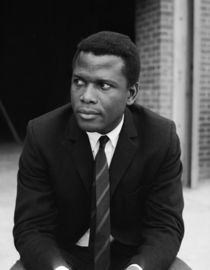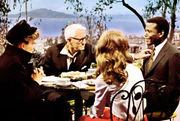Sidney Poitier
 Sidney Poitier reads his own article. | |
| Born | December 20, 1927 Miami, Florida |
|---|---|
| Occupation | Actor, director |
| Died | January 6, 2022 |
“What happened to Sidney Poitier? Did he dry up like a raisin in the sun?”
Sir Sidney Poitier (February 20, 1927 – January 6, 2022) was an African American actor, best remembered for his role as Carl on the hit T.V. show Family Matters. Though he struggled for equality in a segregated Hollywood, he never gave up on his dream. He worked in the movie industry for sixty-something years and enriched the lives of at least three people.[1]
Early life, they call me Mr. Poitier[edit | edit source]
Sidney Poitier was born in Miami, Florida, to a pair of illegal immigrants from the Bahamas. His father, Reginald Pedro Poitier, was a fruit picker; his mother, Evita Poitier, was a dishwasher. They were an impoverished family, living mainly off orange peels and any bits of dried crumbs his mother might have scraped off of dinnerware.
Young Sidney was a poor student, often doodling in his textbooks or just daydreaming. His mother eventually learned, but Sidney never graduated.
At the age of fourteen Sidney was told he would have to get a job. Being a poor black kid, there were few jobs available to him. He moved from one job to the next. His first job was as a shoe shiner at the local negro barbershop. He worked hard the first week and soon received his paycheck, an entire dollar. The young boy rushed home excited and quickly framed the dollar. He was proud of his first week's wages and upon his father's return from work he showed him the dollar. His father quickly berated him for being stupid and told him if he wanted to eat this week he better break that fucking dollar out of that frame.
Poitier's abuse at the hands of his father continued for many years until Sidney was seventeen. His father, mad at Sidney for forgetting to give him his daily sponge bath, suffered a major heart attack and dropped dead instantaneously. No one attended the funeral service.
Acting[edit | edit source]
Now in his early twenties, Poitier dreamt of acting. He watched big actors like Rock Hudson and Cary Grant, and wanted to be them, only black and not gay or British. He found his big break on a different stage though, starring in the first interracial porno, Lilies of the Field, alongside Lisa Skala. The movie was heralded as a success, but Poitier's part in it was forgettable.
A prune in the daylight[edit | edit source]
Sidney soon found luck masquerading as a script entitled Dead Dad's Money and Whites' Suburbs. The role called for a strong, black male lead. Sidney took his shot, playing the lead role of Willy Newer, a young man trying to convince his mom, Bernita, to help him live his dream – opening a liquor store. The movie was a commercial failure at the box office and Poitier almost quit acting entirely, but the DVD sales of the movie tripled the studio's investment and Sidney was a star.
In the lukewarmth of the night[edit | edit source]
Scripts were soon being thrown at Poitier, and for once it wasn't just a Hollywood hate crime. One script in particular, that struck him right below his temple, involved a taboo topic of the time, racial equality.
In the movie Colored Guy and the Bumpkin, a white sheriff from Mississippi (Rod Steiger) travels to Philadelphia to thwart a savage serial killer. The Philadelphian detective assigned to the case (played by Poitier) puts aside racial differences and helps the sheriff catch the killer. The killer turns out to be Hispanic in the end, and they both call him a wetback and tell him to get a real job, just before hanging him.
Because of the movie Sidney won the Academy Award that year for best fight sequence involving an actual infant. The movie spawned a television series called, All in the Family, but no one cared.
Guess who showed up for breakfast[edit | edit source]

Now on a roll, Poitier thought he was a god, that he was unstoppable. His next film would almost ruin his career forever.
In June 1966 Poitier started production on Banging a White Chick, a controversial film in its day because it involved a black man eating with a white family in broad daylight. The country was not ready for such scandal and the film was boycotted across the United States. In Alabama they went as far as to burn effigies of Poitier and wave protest signs around with phrases written on them like, "Sleep with my wife, kill my children, but don't eat at my table." It would be years before Sidney Poitier worked in Hollywood again.
The 70s & 80s[edit | edit source]
In the early 1970s Sidney Poitier turned to drinking and drugs to fill the void in his soul. He was eventually arrested in his Miami beach house after a heavy night spent boozing and snorting cocaine out of Maya Angelou's vagina. The incoherent Poitier struck a cop with an unopened soda can upon the officer's entry to his estate and shouted, "They call me Mr. Pibb!" The officer's partner was forced to subdue the belligerent Poitier by beating the dangerous actor several hundred times with his nightstick.
Behind bars[edit | edit source]
Sidney Poitier was tried and found guilty of assaulting a police officer on March 17, 1974. He was sentenced to two years in prison and forced to pay a fine of twenty dollars.[2] While serving his sentence in a small maximum security facility in Texas,[3] Poitier witnessed an elderly man taking care of a baby squirrel. The old man loved and nurtured the rodent until it achieved adulthood; of course once it reached a proper, legal age the old man had his way with it, turning it in to a sort of rigid squirrel kebab. Nevertheless the act of caring for something so small and defenseless sparked an emotion in Poitier that would change his career forever. He would become a director.
The director[edit | edit source]
Poitier directed somewhere between twenty and a hundred movies from 1976 to 1985. His most notable was Stir Crazy in 1980, starring Richard Pryor and Gene Wilder. The film was about two chefs from New York who move to L.A. to strike it rich in the catering business. They eventually become habitual stirrers who must use their bodies to sexually solicit men for cash so they can feed their stirring addiction. The movie was a commercial success and put Poitier's career back on the fast track to the A-list.
Since 1990[edit | edit source]
In 1989 Poitier read a manuscript for a television show that excited him in ways only a masterpiece could. He ended his twenty-year retirement and began to act again. The television show was Family Matters. American audiences fell in love with the show and Poitier experienced an acceptance he had never experienced before. He had finally made it. The show enjoyed a nine-year run that served to slingshot Sidney Poitier's career into stardom.
After Family Matters left the airwaves Poitier continued to act in many great films, under various pseudonyms. In 2005 he received the coveted Black Entertainment Television Award[4] for best attempt to integrate into a white society. He was also awarded the Hershey's Chocolate Bar for Excellence by the NAACP. It melted and attracted ants.
Death[edit | edit source]
Sidney Poitier died on January 6, 2022, from Gab Figment Nixing Syndrome (GFNS), a rare condition that causes someone to blink out of existence due to the entirety of Earth forgetting that they are still alive. He will always be, ironically, remembered by those who loved him as a man who fought for his beliefs, his dreams and his equality. He was not just a man who was black – he was more than that. He was a rich man who was black.


